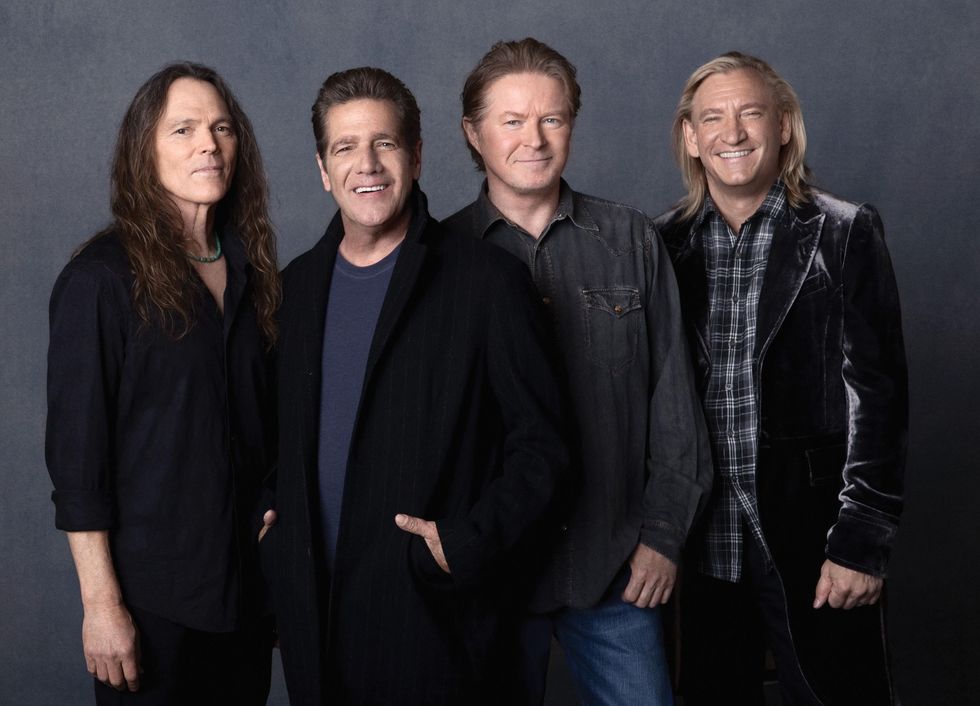Sundance Film Festival 2013
Sundance hits high notes with films starring Mick Jagger, Aretha Franklin and The Eagles
At the onset of the Sundance Film Festival, executive director John Cooper said that one of the big themes this year is music. After watching many serious documentaries and dramas, I felt it was time to rock out. A number of documentaries focusing on the music of prior eras have premiered to enthusiastic crowds. These are three winners.
Twenty Feet From Stardom
This film profiles six mostly African-American singers who perform in the shadows of stars such as Ray Charles, Bruce Springsteen, the Rolling Stones, Sting, Stevie Wonder and Bette Midler. Directed by Grammy-nominated filmmaker Morgan Neville, the film includes never-before-seen archived footage, anecdotes that will make you laugh and cry, and, of course, music.
And the music is emotional, uplifting and just downright awesome.
During the Q&A session, the audience was treated to live, impromptu performances by the film’s featured backup singers.
One of the film’s best moments occurs when Mick Jagger and backup singer Merry Clayton recount the late-night recording session — she in a bathrobe and rollers — that resulted in one of the Rolling Stones’ most iconic tracks, “Gimme Shelter." The film is an entertaining history lesson, but what makes it over-the-top enjoyable is the big personalities of backup singers.
Twenty Feet was shown in the coveted opening-night spot and was welcomed with tears and a standing ovation. During the Q&A session that followed, the audience was treated to live, impromptu performances by three of the film’s featured backup singers — Clayton, Tata Vega and Judith Hill. At a later showing, Darlene Love and Lisa Fischer joined in to the delight of the audience.
It was the first film to be snatched up by the Weinstein Company, and it will be released in theaters this summer.
History of The Eagles: Part 1
Because The Eagles have been so averse to press scrutiny for nearly four decades, it comes as a welcome surprise that these rock superstars agreed to cooperate with a no-holds-barred documentary that traces their career from humble beginnings to their meteoric rise to their split in 1980.
Produced by Oscar-winning documentarian Alex Gibney (Enron: The Smartest Guys in the Room) and directed by longtime documentary editor Alison Eliwood, the film, which premiered to an enthusiastic standing ovation during the first weekend of Sundance, focuses on the band’s songwriting talent and almost mystical synergy.
Glenn Frey concluded the Q&A by saying, “We are going to go back on the road soon.” Let’s hope so.
Eagle fans will delight in never-before-seen footage of a 1977 shelved documentary, as well as concert footage from their final “Hotel California” tour.
This highly entertaining movie does not shy away from the band’s friction in later years nor their substance abuse. The film ends in 1980 as the band implodes, but the last scene shows a sign that reads, “The Eagles Reunited in 1994 — but that is another story. Stay tuned for part 2.”
All four current band members appeared for a Q&A following the film. For those who haven’t seen The Eagles in a decade or two, the wrinkled, middle-aged men who appeared on stage look a lot different from the ebullient long-haired musicians of the '70s. But they still maintained an unbridled enthusiasm for music and life.
When asked why film a documentary now, Glenn Frey said, “If we were ever going to do it, now is the time.” He said the band did research on what documentaries had won Academy Awards, not paying attention to whether or not the subjects were musicians, and chose Gibney to produce it.
Eagle fans will not have to wait long to see the movie, as Showtime has acquired the two-part documentary and will show part 1 on February 15 and part 2 on February 16.
Frey concluded the Q&A by saying, “We are going to go back on the road soon.” Let’s hope so.
Watch History of the Eagles: Part 1 trailer:
Muscle Shoals
Music aficionados and historians will delight in Muscle Shoals, which explores how a small town in northwest Alabama became the music recording mecca for musicians like the Rolling Stones, Aretha Franklin, U2, John Paul White of Grammy-nominated Civil Wars, Alicia Keys and countless others.
To watch footage of Muscle Shoals native Percy Sledge recording “When a Man Loves a Woman” and Aretha Franklin recording “Respect” is an incredibly emotional experience.
This ambitious and intimate documentary comes from first-time director/former real estate developer Greg Camalier. It tells the stories of FAME Studios, founded in the late 1950s, and its offshoot, Muscle Shoals Sound Studios, through interviews with Bono, Franklin, Keith Richards, Mick Jagger and a score of other mega artists. The film is interlaced with hauntingly beautiful cinematography of Muscle Shoals, the story of Fame Studios founder Rick Hall, and the music itself.
And, oh my, the music! To watch footage of Muscle Shoals native Percy Sledge recording “When a Man Loves a Woman” and Franklin singing “Respect” is an incredibly emotional experience.
It was hard to tell if the audience was watching a film or attending a concert as wild applause continued throughout the film. What also makes the Muscle Shoals sound so distinctive is that black and white performers, each versed in a different style, worked together at a time in our country’s history that was not common — especially in Alabama.
While long (110 minutes) for a documentary, I hated to see the film end. During the Q&A, Camalier admitted that the list of Muscle Shoals alumni was so large that if they had included everyone, the movie would have lasted 12 hours and required meal breaks.
As we walked out of the theater, I overheard one person saying, “This film makes my heart sing.” I could not agree more.
Muscle Shoals was a late entry to the Sundance competition, and so was only shown the last day of the festival. As a result, it has not gotten the exposure, and no distribution deal has been announced.
When asked about that and whether there would be a soundtrack, Camalier said, “Stay tuned.”



